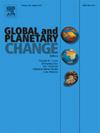北方各地叶片临界衰老年龄的时空变化及其主要驱动因素
IF 4
1区 地球科学
Q1 GEOGRAPHY, PHYSICAL
引用次数: 0
摘要
叶片衰老是一个关键的物候事件,标志着植被树冠的老化,并引发各种生物地球化学过程的突然转变。然而,北方地区叶片衰老的时空模式及其主要驱动因素仍不清楚。在这项研究中,我们引入了一个称为叶片临界衰老年龄(CSA)的概念来表征衰老阶段的开始,它量化了植被生长和衰老开始日期之间的时间跨度。随后,我们利用长期遥感植被指数数据,研究了北方陆地(北纬 30°)叶片临界衰老年龄的时空变化。从空间上看,叶片CSA的变化范围很大(从42天到263天不等),平均为146±32天。落叶阔叶林的叶片CSA最长(177 ± 28 天),而灌木林的叶片CSA最短(121 ± 22 天)。从时间上看,大多数植物功能类型的叶片 CSA 趋势在 2010 年前后发生了逆转,导致整个北部地区在 1982-2010 年(+0.21 天/年)和 2010-2015 年(-2.36 天/年)之间出现了截然不同的趋势。进一步的随机森林回归和偏相关分析共同表明,温度是驱动叶片CSA时空变化的主导因素。这些研究结果表明,气候变暖正在重塑叶片衰老年龄的地理模式,给未来陆地对气候变化的反馈预测带来了极大的不确定性。本文章由计算机程序翻译,如有差异,请以英文原文为准。
Spatiotemporal variability of leaf critical senescence age across northern lands and its key drivers
Leaf senescence, a pivotal phenological event, signifies the aging of vegetation canopies and triggers abrupt shifts in various biogeochemical processes. However, the spatiotemporal pattern of leaf senescence age and its primary driving factors across northern lands remains unclear. In this study, we introduced a concept termed leaf critical senescence age (CSA) to characterize the initiation of senescence stage, which quantifies the time span between the onset dates of vegetation growth and senescence. Then, utilizing long-term remote sensing vegetation index data, we investigated the spatiotemporal variations of leaf CSA over northern lands (>30°N). Spatially, leaf CSA displayed extensive variability (ranging from 42 to 263 days), with an average of 146 ± 32 days. Deciduous broadleaf forests exhibited the longest CSA (177 ± 28 days), while shrublands demonstrated the shortest (121 ± 22 days). Temporally, most plant functional types experienced a reversal in leaf CSA trends around 2010, leading to the contrasting trends between 1982–2010 (+0.21 days/year) and 2010–2015 (−2.36 days/year) across northern lands. Further random-forest regression and partial correlation analysis together indicated that temperature was the dominant factor driving spatiotemporal variations in leaf CSA. These findings suggest that climate warming is reshaping the geographical pattern of leaf senescence age, posing great uncertainty to future projections of terrestrial feedback to climate change.
求助全文
通过发布文献求助,成功后即可免费获取论文全文。
去求助
来源期刊

Global and Planetary Change
地学天文-地球科学综合
CiteScore
7.40
自引率
10.30%
发文量
226
审稿时长
63 days
期刊介绍:
The objective of the journal Global and Planetary Change is to provide a multi-disciplinary overview of the processes taking place in the Earth System and involved in planetary change over time. The journal focuses on records of the past and current state of the earth system, and future scenarios , and their link to global environmental change. Regional or process-oriented studies are welcome if they discuss global implications. Topics include, but are not limited to, changes in the dynamics and composition of the atmosphere, oceans and cryosphere, as well as climate change, sea level variation, observations/modelling of Earth processes from deep to (near-)surface and their coupling, global ecology, biogeography and the resilience/thresholds in ecosystems.
Key criteria for the consideration of manuscripts are (a) the relevance for the global scientific community and/or (b) the wider implications for global scale problems, preferably combined with (c) having a significance beyond a single discipline. A clear focus on key processes associated with planetary scale change is strongly encouraged.
Manuscripts can be submitted as either research contributions or as a review article. Every effort should be made towards the presentation of research outcomes in an understandable way for a broad readership.
 求助内容:
求助内容: 应助结果提醒方式:
应助结果提醒方式:


